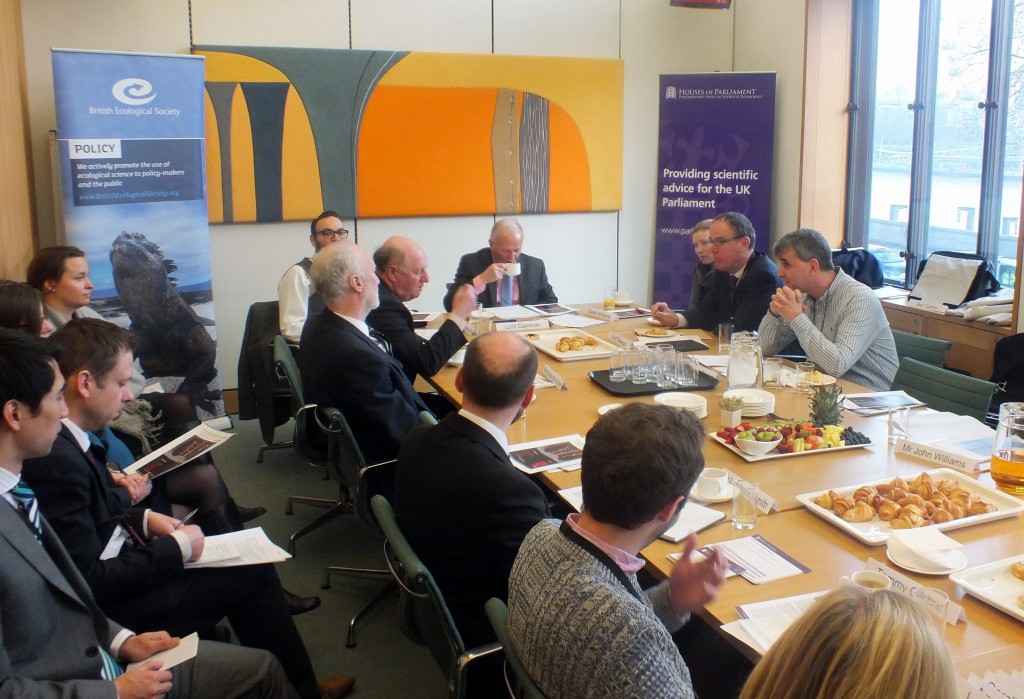Reducing Greenhouse Gas Emissions from Crops: New POSTnote Launched
Yesterday saw a working breakfast at Portcullis House to launch the Parliamentary Office of Science and Technology’s (POST) latest POSTnote, on the topic of reducing greenhouse gas emissions from crops. The event was organised by Beth Brockett, the latest recipient of the BES POST Fellowship, who co-authored the publication alongside POST Deputy Director and BES Public and Policy Committee member Dr Jonathan Wentworth.
POSTnotes are designed to distil current and emerging scientific issues into a digestible, policy relevant format that allows parliamentarians to quickly get to grips with complex topics. The considerable skill required – and well demonstrated by Beth – to effectively synthesise the state of scientific knowledge on a topic and communicate it in a clear manner was highlighted by the sheer breadth of discussion over the course of the morning. The meeting brought together seven experts in the field with MPs, Peers and their staff to explore the themes of the report.

Professor Dave Reay of the University of Edinburgh started the discussion by setting the issue of reducing emissions from crops in context. Crop production must be treated as a global issue – in the UK we import 40% of our food – and is subject to a number of pressures: increased demand due to population growth, land-use conflicts, and loss of productivity due to climate change. Dr Luke Spadavecchia provided further policy context, highlighting Defra’s role in reporting reductions in agricultural emissions – which account for 10-12% of the global total – under the Kyoto Protocol Encouragingly, he explained, greenhouse gas emissions from the agricultural sector as a whole in the UK have declined by 20% since 1990, largely as a result of a fall in livestock populations due to CAP reform, diseases and consumer preference. For emissions from crops, Defra’s current mitigation policy centres on industry led, voluntary schemes aimed at reducing inefficiencies first and foremost.
The next speakers drilled down further into the technical aspects of reducing emissions from crops. While discussion of greenhouse gases usually focuses on carbon dioxide emissions, in agriculture it is nitrous oxide (N2O) that is the primary contributor to global warming. Nitrous oxide emissions primarily arise from microbial activity following the application of man-made fertilisers, and John Williams of agricultural consultants ADAS UK Ltd outlined the importance of good nitrogen management on farms – optimising crop yield without over-applying fertilisers. Professor Simon Blackmore (Harper Adams University) then expounded upon the exciting possibilities of precision farming, which employs advances in digital technology and engineering to make crop production processes more efficient – and less energy intensive – through “intelligently targeted inputs”, from spraying herbicides at the leaf scale to targeting specific species with “weeding robots”.
The group then heard from The Organic Research Centre’s Laurence Smith, who outlined how agroecology – farming systems that focus on the long term protection of natural resources – can also offer tools for conventional farms to reduce inputs and improve soil carbon management. Professor Malcolm Bennett then offered a glimpse of the future, explaining the potential role of plants in reducing nitrogen applications, through selective breeding for roots with improved take-up of soil nutrients, to the long-term (and possibly unattainable) goal of producing genetically-modified cereals with the nitrogen fixing capabilities of legumes.
The range of emerging technologies and innovative research presented painted an encouraging picture of how we might meet the challenge of reducing greenhouse gas emissions from crops. But how do we ensure that this research translates into both the creation of appropriate policy frameworks, and into changing farming practices on the ground? BES President Professor Bill Sutherland concluded the session with a call for the better use, assessment and communication of evidence to support decision making by both farmers and policy-makers, as exemplified by the Conservation Evidence website. The ensuing discussion identified the need for genuine knowledge transfer between scientists, policy-makers, and importantly, farmers, to ensure both that the latest research is put into practice, and that researchers are addressing practitioners’ most pressing questions.
The BES POST Fellowship offers PhD students who are BES members a great opportunity to work at this interface between science and policy through contributing to a POSTnote or other report, and to gain valuable experience of working inside Westminster. Fellowships last for three months, and fellow receive a £5,000 bursary to cover living expenses. Applications for the 2015 Fellowship are open until Friday 10th April – apply now or contact the BES External Affairs Team for more information.
Like what we stand for?
Support our mission and help develop the next generation of ecologists by donating to the British Ecological Society.